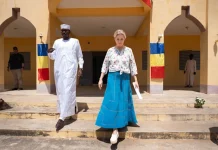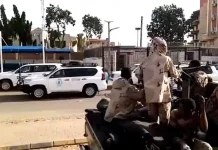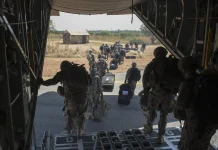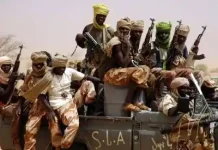Residents in the Sudanese capital Khartoum on Monday, April 17 woke to the sounds of artillery and bombardment by warplanes, as intense fighting continued for a third day with death toll reaching 100, while hundred more are injured.
Clashes first erupted on Saturday April 15, between the country’s military and the paramilitary group Rapid Support Forces (RSF), led by Mohamed Hamdan Dagalo, also known as Hemedti, who revealed the Sudanese army had broken a UN-brokered temporary humanitarian ceasefire.

Reports say the mortars and artillery fire came in the direction of Khartoum International Airport and Sudanese Army garrison sites.
The U.N. had announced a three-hour cease-fire late Sunday afternoon between the two groups, yet residents told media that heavy explosions and continued gunfire, as well as airstrikes pounding RSF targets, could be heard Sunday night.
Social media video footage show military jets and helicopters hitting the airport; other clips show the charred remains of the army’s General Command building nearby after it was engulfed in fire on Sunday.
In the Kafouri area, north of Khartoum, clashes and street fights broke out at dawn Monday, prompting residents to begin evacuating women and children from the area, Sudanese journalist Fathi Al-Ardi wrote on Facebook.
In the Kalakla area, south of the capital, residents reported the walls of their houses shaking from explosions.

Reports also emerged of battles hundreds of miles away in the eastern city of Port Sudan and the western Darfur region over the weekend.
As of Monday, at least 97 people have been killed, according to the Preliminary Committee of Sudanese Doctors trade union.
Earlier on Sunday, the World Health Organization estimated more than 1,126 were injured.

In an interview with CNN, Dagalo blamed the military for starting the conflict and claimed RSF ‘had to keep fighting to defend ourselves.’
He said that the army chief and his rival, Abdel Fattah al-Burhan, had lost control of the military.
When asked if his endgame was to rule Sudan, Dagalo said he had ‘no such intentions,’ and that there should be a civilian government.
Access to information in the country is also limited, with the government-owned national TV channel now off the air with reports indicating it is in the hands of the RSF.












